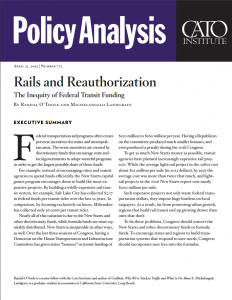Full Title: Rails and Reauthorization: The Inequity of Federal Transit Funding
Author(s): Randal O’Toole and Michelangelo Landgrave
Publisher(s): Cato Institute
Publication Date: April 1, 2015
Full Text: Download Resource
Description (excerpt):
Federal transportation aid programs often create perverse incentives for states and metropolitan areas. The worst incentives are created by discretionary funds that encourage state and local governments to adopt wasteful programs in order to get the largest possible share of those funds.
For example, instead of encouraging cities and transit agencies to spend funds efficiently, the New Starts capital grants program encourages them to build the most expensive projects. By building a wildly expensive rail transit system, for example, Salt Lake City has collected $2.17 in federal funds per transit rider over the last 22 years. In comparison, by focusing exclusively on buses, Milwaukee has collected only 26 cents per transit rider.
Nearly all of this variation is due to the New Starts and other discretionary funds, while formula funds are more equitably distributed. New Starts is inequitable in other ways, as well. Over the last three sessions of Congress, having a Democrat on the House Transportation and Infrastructure Committee has given states “bonuses” in transit funding of$120 million to $160 million per year. Having a Republican on the committee produced much smaller bonuses, and even produced a penalty during the 111th Congress.
To get as much New Starts money as possible, transit agencies have planned increasingly expensive rail projects. While the average light-rail project in the 1980s cost about $25 million per mile (in 2013 dollars), by 1997 the average cost was more than twice that much, and light rail projects in the 2016 New Starts report cost nearly $200 million per mile.
Such expensive projects not only waste federal transportation dollars, they impose huge burdens on local taxpayers. As a result, far from promoting urban growth, regions that build rail transit end up growing slower than ones that don’t.
To fix these problems, Congress should convert the New Starts and other discretionary funds to formula funds. To encourage states and regions to build transportation systems that respond to user needs, Congress should incorporate user fees into the formulas.
